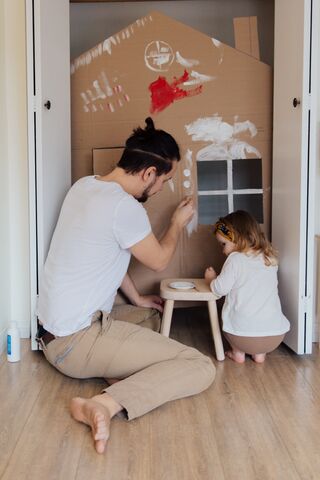Grief
Why We May Be Tempted to Deny Ourselves Joy
What to do when worries and grief stifle our positive emotions.
Posted June 13, 2022 Reviewed by Vanessa Lancaster
Key points
- We don't always allow ourselves a full expression of joy, yet we're worthy of it.
- It's okay to experience positive emotions, even knowing there is suffering in the world.
- Foreboding joy can sour our positive emotions, but we can reinterpret that feeling to increase gratitude.
This post is part two of a two-part series on how we may be unintentionally sabotaging our joy. You can read Part 1 here, where I discuss stifling joy to fit cultural norms.

We may find ourselves withholding positive emotions when we feel like our enthusiasm would be judged harshly. For example, I recently got more enjoyment out of attending a local political debate than I did watching the Super Bowl. At first, I was embarrassed to be fascinated by something many people see as boring. Then, I realized I’m worthy of joy at every opportunity, and I embraced it.
When Displaying Joy after Tragedy
Another situation in which we may deny ourselves joy is when we remember the calamities throughout the world. How can we be happy, knowing so many are suffering?
One of the pillars of emotional intelligence is empathy. When tragedy strikes, it’s important to face those who are suffering and honor their grief. As researcher David Kessler said:
Each person’s grief is as unique as their fingerprint. But what everyone has in common is that no matter how they grieve, they share a need for their grief to be witnessed. That doesn’t mean needing someone to try to lessen it or reframe it for them. The need is for someone to be fully present to the magnitude of their loss without trying to point out the silver lining.
Is this not the very case where positive emotions should rest and allow us to mourn with those who mourn?
There are two types of empathy. One is affective empathy, where we internally feel the same emotions as someone else. After learning about the school shooting in Uvalde, TX, parents may have pictured how they would feel if they had learned their child would not be returning home. This type of empathy can lead to empathic distress.
We may be so proficient at imagining ourselves in the shoes of someone who is sorrowful that the feelings become genuinely overwhelming, and we begin to look away from their grief. Affective empathy can lead to pain and disengagement.
The second type of empathy is cognitive empathy. This type allows us to recognize the emotions of others without necessarily feeling the emotions themselves. We may identify that someone who has just lost a child is experiencing unspeakable anguish, but rather than becoming immersed in our empathic pain, we cultivate feelings of compassion.
Compassion leads us to feel warmth, love, and a desire to alleviate the pain of another rather than abandon them in their grief. We can still honor the grief of others by transforming our empathy into compassion. Using cognitive empathy can leave us feeling energized instead of depleted.

How do we carry on with normal tasks when we know others are feeling distraught? Do we learn of the horrors inside Robb Elementary School and then simply sweep the dirt from our porch and drop off our dry-cleaning? Do we carry out our scheduled vacation plans and family trips while other families attend wakes and funerals?
We may feel guilt for engaging in pleasurable activities, knowing others are experiencing utter hopelessness. What can we do? When one mother who had lost a child was asked what she needed from other parents, she said she just wanted parents to cherish their children.
There will always be suffering in the world. While there are times to face it, there are times to recharge. No one can pour from an empty cup. Which is to say, we will be less effective at advocating for the marginalized if we allow burnout.
We can honor those who have experienced loss and suffering by not taking those in our life for granted. We can be immersed in the joy we feel around us, grateful to have our breath flow in and out of our lungs. After we’ve been filled with compassion for those who are suffering, we can remember the reasons life is still worth living.
When Foreboding Joy Sours our Positive Emotions
In researcher Brene Brown’s book, The Gifts of Imperfection, she wrote:
For years, my fear of something terrible happening to my children actually prevented me from fully embracing joy and gratitude. Every time I came too close to softening into sheer joyfulness about my children and how much I love them, I’d picture something terrible happening; I’d picture losing everything in a flash.

This is what Brown referred to as "foreboding joy." There is that delightful moment when everything seems right, and our hearts expand with warmth and joy. Then, that feeling starts to morph. The foreboding thoughts may say, “Oh no, something bad is going to happen; this feels too good.” We become convinced that, inevitably, the other shoe will drop.
Joy is one of our most vulnerable emotions. Opening ourselves up to authentic joy means facing the reality that our hearts can be crushed and our hopes dashed.
As Kessler put it, “You don't have to experience grief, but you can only avoid it by avoiding love. Love and grief are inextricably intertwined.” Do we laugh playfully with our children and then immediately picture them with a terminal illness?
Maybe if we stifle our joy, we can be prepared when tragedy strikes, right? As Brown recounted:
A man in his early sixties told me, ‘I used to think the best way to go through life was to expect the worst. That way, if it happened, you were prepared, and if it didn’t happen, you were pleasantly surprised. Then I was in a car accident and my wife was killed. Needless to say, expecting the worst didn’t prepare me at all. And worse, I still grieve for all of those wonderful moments we shared and that I didn’t fully enjoy. My commitment to her is to fully enjoy every moment now. I just wish she was here, now that I know how to do that.’
What can we do when we sour our joy with worry? Remember that it’s because of love that tragedy would sting so bad. When I picture my children experiencing hardship and pain and begin to fret about the unknown future, I remind myself that losing them would hurt because they are the most incredible little humans. I'm lucky to have them. I allow my gratitude for my family to take over.
We deserve to find joy in our hobbies, even if others don’t understand. We are worthy of finding joy after a tragedy, even if others are suffering. We can rest assured that our fears and worries stem from knowing just how good we have it.
Joy is open to everyone.
Read part 1 of 2.




